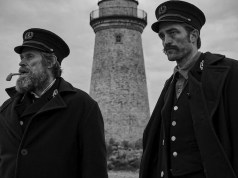Dios mio, what a movie is “Pan’s Labyrinth”! It’s a dark fairy tale, complete with a wicked stepparent, but by no means is it for children. Yet if it weren’t for the grim, sometimes shocking violence, it would be the sort of story children love, with a young hero encountering fantasy, mystery, and magic.
Call it a fairy tale for grown-ups, then, written and directed by Mexican filmmaker Guillermo Del Toro (“Blade II,” “Hellboy”) and set in Spain in 1944. The Spanish Civil War has been over for five years, but Franco’s fascist armies are still rooting out resistance sympathizers hiding in the hills and fighting guerrilla warfare. A particular government-owned mill has been attacked by these freedom fighters, so Franco has sent military forces to guard it.
Into this dreary situation comes a little girl named Ofelia (Ivana Baquero) and her mother, Carmen (Ariadna Gil). Ofelia’s father was killed during the war and Carmen has since remarried and gotten pregnant. Her new husband is Capt. Vidal (Sergi Lopez), the commandant at the mill. He has sent for his new wife and stepdaughter to join him — primarily, it would seem, so that he can supervise the birth of his heir, to hell with the wife and stepdaughter.
We know immediately that Capt. Vidal is a stern, authoritarian man, different only in gender from the stepparents of the Grimms’ fairy tales. Soon we see he’s even worse than that: He’s also a cruel, vicious killer. His treatment of two men suspected of being resistance fighters is offered as proof.
While exploring the grounds surrounding the outpost, young Ofelia encounters a stone labyrinth in which she meets a faun — a goat-man, like Mr. Tumnus in “The Chronicles of Narnia,” except this one (played by Doug Jones) is more fantastic and ghastly looking, part nightmare and part children’s story. He’s extremely tall and walks on bent legs and cloven hooves that do not seem at all ergonomic. His voice is a deep growl that hovers between serene and menacing.
The faun tells Ofelia that she is the princess of the underworld. She left her home and her true father, the king, years ago, took human form, and forgot her past life. Her people have been eagerly awaiting her return via a portal in the center of the labyrinth. But before the portal can be opened, Ofelia must — you guessed it — complete three tasks. (There are always three tasks, aren’t there?)
Ofelia’s tasks involve collecting certain supernatural artifacts, guided in part by the faun’s instructions and by a magic book he gives her that reveals her instructions. Some of these sequences are spellbinding and frightening, scary enough to make you hide your face, but so macabrely imaginative that you’re compelled to watch. Why, there’s a monster whose eyes are on his hands! And looks what he does to those poor fairies! I can’t bear to watch/can’t resist watching!
Meanwhile, Del Toro balances this exciting fairy-tale world with the stark terrors of real life. Capt. Vidal continues to wage war on the resistance fighters in the hills, unaware that certain members of his household staff are sneaking food and medicine to them. Is fantasy the only escape from the treachery of the real world?
Del Toro is exploring deep themes here, with long, symbolic histories. The story of an innocent who comes to this world from a better one and longs to shake off the shackles of mortality and return to paradise is as old as time. And just as deeply entrenched in our consciousness is the sad fact that no matter how horrible a thing your imagination can conjure, real people are capable of much worse. The real monster in “Pan’s Labyrinth” isn’t the creature with eyes on its hands; it’s Capt. Vidal.
We also find an undercurrent of viva la revolucion in Del Toro’s curious fable. Unquestioning obedience to authority is depicted as a poor philosophy to go by … except in one sequence, where Ofelia’s failure to blindly obey instructions almost gets her killed. I’m not sure what message we should glean from that — follow the rules sometimes; other times, think for yourself? — but this morbid, visually stunning fairy tale gives you plenty to think about and plenty to be entertained by.
A- (1 hr., 52 min.; Spanish with subtitles; )





